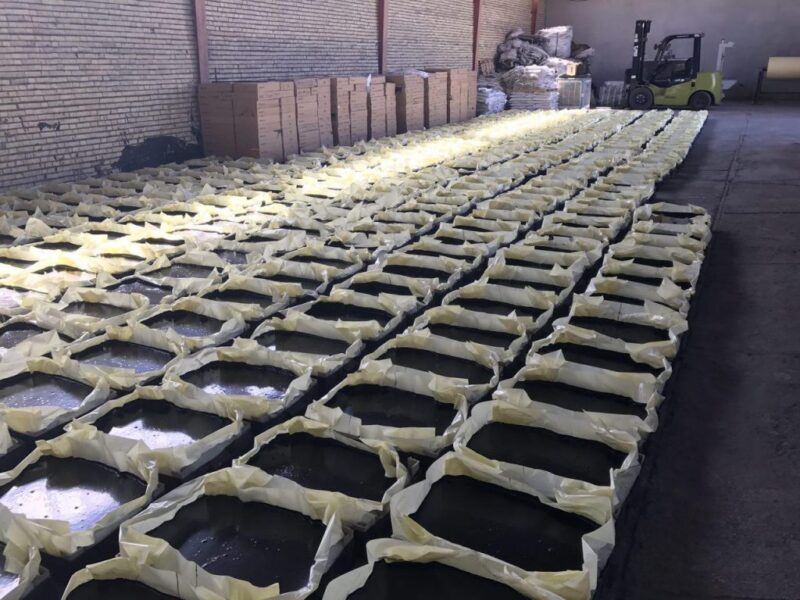What is Oxidized Bitumen? Complete Guide to Types, Grades, Uses & Benefits
Oxidized Bitumen, also known as blown asphalt or air-blown bitumen, is a specialized form of bitumen that has undergone a controlled oxidation process. It is produced by blowing air through hot bitumen at elevated temperatures, causing it to undergo chemical changes and increase in viscosity.
What is Oxidized Bitumen?
Oxidized Bitumen, also known as blown bitumen, is a semi-solid grade of bitumen that has been treated with air at high temperatures. This air-blowing process modifies the molecular structure of bitumen, resulting in a more rubbery, harder material with higher softening points and lower penetration levels.
Unlike penetration-grade bitumen, Oxidised asphalt is more temperature-stable, non-penetrable, and water-resistant, making it ideal for industrial applications such as:
-
Roofing membranes
-
Waterproofing
-
Joint fillers
-
Pipe coatings
-
Flooring compounds
⚗️ How is Oxidized Bitumen Produced?
Blown asphalt is produced through a process called air blowing:
-
Base bitumen (usually 60/70 or 80/100 penetration grade) is heated in a reactor.
-
Hot air (at 230–290°C) is blown through the molten bitumen.
-
This causes a reaction between the bitumen’s hydrocarbons and oxygen.
-
The result is a bitumen product with increased molecular weight and altered rheological properties.
This oxidation leads to a stiffer, more elastic material with better aging characteristics and resistance to flow at high temperatures.
The oxidation process involves the introduction of air into the bitumen at temperatures ranging from 150 to 200 degrees Celsius. This causes the bitumen to react with oxygen, resulting in the formation of polar compounds and increased molecular weight. The degree of oxidation can be controlled to achieve the desired properties.
Characteristics of Oxidized Bitumen
| Property | Result |
|---|---|
| Penetration | Low (10–40 dmm) |
| Softening Point | High (85°C–150°C) |
| Ductility | Lower than penetration grade |
| Temperature Resistance | Excellent |
| Water Resistance | Excellent |
| Elastic Recovery | Moderate to high |
Oxidized Bitumen is characterized by its higher softening point, increased stiffness, and improved resistance to temperature variations. It has a higher penetration resistance and lower susceptibility to deformation under high temperatures compared to conventional bitumen.
📊 Grades of Oxidized Bitumen
Oxidized bitumen is typically graded based on softening point (°C) and penetration (dmm) values. Common grades include:
| Grade | Softening Point (°C) | Penetration (dmm) | Applications |
|---|---|---|---|
| 85/25 | 85 | 25 | Roofing, industrial adhesives |
| 90/40 | 90 | 40 | Waterproofing, pipe coating |
| 95/25 | 95 | 25 | Expansion joints, cable coatings |
| 115/15 | 115 | 15 | Flooring, heavy-duty roofing membranes |
| 150/5 | 150 | 5 | Insulation, bridge joint sealing |
Each grade is chosen depending on the temperature resistance, hardness, and flexibility required.
🏗️ Applications of Oxidized Bitumen
Due to its enhanced properties, Oxidised asphalt is commonly used in various applications. It is widely used in the manufacturing of roofing materials, such as roofing shingles and membranes, as it provides excellent waterproofing and weather resistance.
The increased stiffness and durability of Blown Asphalt make it suitable for withstanding extreme weather conditions and prolonging the lifespan of roofing systems.
Oxidized bitumen is preferred in industries where thermal stability, waterproofing, and durability are essential.
🔹 Roofing Industry
-
Used as a roofing felt binder
-
Creates highly durable membranes
-
Maintains shape and adhesion in hot climates
🔹 Waterproofing Systems
-
Common in basement, foundation, and tunnel waterproofing
-
Long-lasting protection against moisture infiltration
🔹 Pipe Coating
-
Protects metal pipelines against corrosion and rust
-
Used in both onshore and offshore pipelines
🔹 Joint Filler & Sealant
-
Used in bridge expansion joints, airport runways
-
Offers flexibility and strength under heavy loads
🔹 Industrial Flooring & Adhesives
-
Used as a bituminous adhesive in insulation panels
-
Provides excellent bonding and heat resistance
Blown Asphalt is also used in the production of industrial and automotive coatings, adhesives, sealants, and soundproofing materials. Its high viscosity and adhesive properties make it an ideal choice for these applications, providing excellent bonding and sealing capabilities.
In road construction, oxidized bitumen is utilized for pavement preservation and maintenance. It is commonly used as a binder in chip seals and surface dressings to improve the durability and skid resistance of the pavement. The increased stiffness of blown asphalt helps prevent the loss of aggregates and reduces pavement cracking.
✅ Advantages of Oxidized Bitumen
✔️ Excellent thermal and aging stability
✔️ Highly water-resistant
✔️ Maintains consistency under load
✔️ Suitable for vertical surfaces (non-drip)
✔️ Available in multiple grades for specific applications
✔️ Long shelf life when stored properly
❌ Limitations of Blown Asphalt
-
Not suitable for road paving (due to brittleness)
-
Requires heating during application
-
Emission of fumes during installation
-
Less elastic at sub-zero temperatures
🌍 Environmental & Safety Notes
-
Must be handled at high temperatures (~200–250°C)
-
Proper PPE is required due to hot material and fumes
-
VOC emissions are lower than cutback bitumen but still regulated
Pars Universal Bitumen ensures REACH-compliant, low-emission oxidized bitumen suitable for export to Europe, Asia, and Africa.
🏭 Oxidized Bitumen from Pars Universal Bitumen
At Pars Universal Bitumen, we manufacture and export premium-quality Oxidised asphalt in a wide range of grades for global infrastructure, industrial, and commercial use.
🛢️ Products available:
🚚 We offer:
-
Bulk or packaged supply
-
Global shipping with export documents
-
Consistent quality & full technical data sheets
-
Custom formulation based on your specs
❓ FAQs About Oxidized Bitumen
Q1: Is oxidized bitumen the same as blown asphalt?
Yes, both terms refer to the same product created by air-blowing base bitumen.
Q2: What is the difference between penetration-grade and oxidized bitumen?
Penetration bitumen is softer and used in road paving. Blown asphalt is harder, more temperature-resistant, and used in industrial applications.
Q3: Can Oxidised asphalt be applied cold?
No. It must be heated to a specific application temperature (typically 180–230°C).
Q4: Is blown asphalt eco-friendly?
It has a lower VOC profile than some alternatives but must still be handled with environmental care. Emulsions are more eco-friendly.
Q5: What packaging options are available?
Pars Universal Bitumen supplies oxidized bitumen in 25kg blocks, paper bags, or steel drums, depending on customer requirements.
Conclusion: The Industrial Value of Oxidised asphalt
Oxidized Bitumen plays a critical role in industrial and construction sectors where high-temperature stability, waterproofing, and durability are essential. Its unique properties—achieved through the air-blowing process—make it ideal for applications such as roofing membranes, pipe coatings, expansion joints, and industrial adhesives.
By choosing the correct grade—such as 85/25, 90/40, or 115/15—engineers and project managers can ensure optimal performance, cost-efficiency, and longevity for infrastructure and industrial applications.
At Pars Universal Bitumen, we supply a full range of Blown asphalt grades tailored to international standards. Backed by technical support, global logistics, and custom packaging, we are your trusted partner for dependable supply and consistent quality.
👉 For more information or to request a technical data sheet, contact us today.
📞 Contact Pars Universal Bitumen
For high-performance oxidized bitumen tailored to your technical needs, partner with a trusted global supplier.
📧 Email: [email protected]
📞 Phone: +971 4 878 2031
🌐 Visit: PUB-Ltd
📩 Request a Quote Today or speak to our technical team for custom solutions. If You have any other Query or Question you want to ask, Please don’t hesitate to Contact Us.





